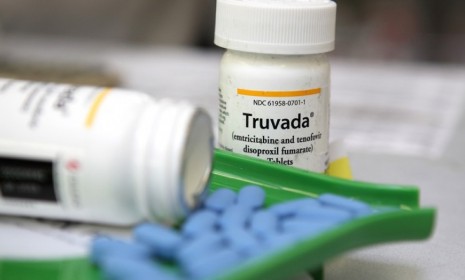Truvada: A guide to the first FDA-approved HIV prevention pill
A revolutionary new drug could slow the spread of a disease that has already infected more than 1 million Americans

In a breakthrough moment in the fight against HIV, the Food and Drug Administration on Monday granted its approval to Truvada, the first medication that helps prevent the spread of the virus among people having sex with infected partners. Here's what you need to know:
How does it work?
Truvada is a combination of two different medicines: Emtricitabine and tenofovir disoproxil fumarate. The drug works by blocking an enzyme in the body that the HIV virus needs to proliferate.
The Week
Escape your echo chamber. Get the facts behind the news, plus analysis from multiple perspectives.

Sign up for The Week's Free Newsletters
From our morning news briefing to a weekly Good News Newsletter, get the best of The Week delivered directly to your inbox.
From our morning news briefing to a weekly Good News Newsletter, get the best of The Week delivered directly to your inbox.
How effective is it?
It's not perfect, but it certainly helps. In one trial — in which an HIV-negative individual had unprotected sex with multiple partners (some of whom were HIV-positive) — the drug reduced the risk of contracting the virus by 42 percent compared to a placebo. In another trial for heterosexual couples in which one partner was infected and condoms were regularly used, Truvada reduced HIV infections by up to 75 percent. That means the pill works best when used in conjunction with other prevention methods. "It's not just, 'Here's a pill, take it, and you're rendered protected," researcher Dr. Kenneth Mayer of Fenway Health in Boston tells NPR. It's most effective when used responsibly, and that means also employing contraceptives, risk reduction counseling, and regular HIV testing.
Who should take the pill?
For "healthy, uninfected people, the drug can thwart HIV's ability to take hold in healthy cells and start an infection," says Alice Park at TIME, but it won't help anyone who's already infected. Still, the pill, which is meant to be taken daily, could be hugely important for the estimated 415,000 Americans whose sexual activity puts them at the highest risk of contracting HIV, says Victoria Colliver at the San Francisco Chronicle. Every year, 50,000 U.S. adults and adolescents are diagnosed with the disease, which affects a total of 1.2 million across the country.
A free daily email with the biggest news stories of the day – and the best features from TheWeek.com
How much does it cost?
If you take Truvada every day (as recommended), it will likely cost in the neighborhood of $14,000 per year.
Are there side effects?
The most common side effects include diarrhea, nausea, abdominal pain, headache, and weight loss. In rare cases, the drug caused kidney problems or bone toxicity. There's also the risk of the HIV virus developing an immunity to Truvada, which is why regular testing is important. Some critics also worry that the drug could lead infected patients to engage in riskier sexual behavior.
Sources: Boston Globe, NPR, San Francisco Chronicle, TIME
-
 ‘Ghost students’ are stealing millions in student aid
‘Ghost students’ are stealing millions in student aidIn the Spotlight AI has enabled the scam to spread into community colleges around the country
-
 A running list of everything Donald Trump’s administration, including the president, has said about his health
A running list of everything Donald Trump’s administration, including the president, has said about his healthIn Depth Some in the White House have claimed Trump has near-superhuman abilities
-
 NASA’s lunar rocket is surrounded by safety concerns
NASA’s lunar rocket is surrounded by safety concernsThe Explainer The agency hopes to launch a new mission to the moon in the coming months